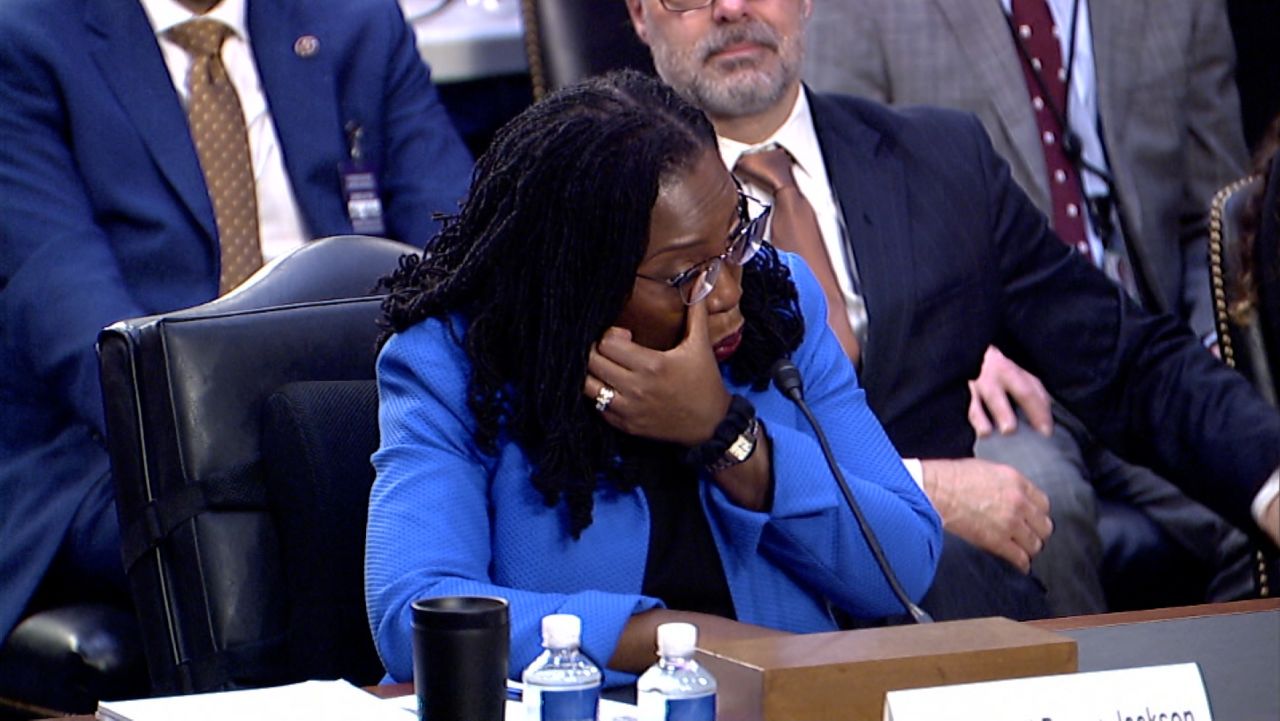Supreme Court nominee Judge Ketanji Brown Jackson finished her two days of questioning on Wednesday, having spent some 22 hours this week being grilled by the Senate Judiciary Committee.
Though there were plenty of lines of contentious questioning from Republicans on Tuesday, some GOP committee members took an even more aggressive approach on Wednesday, repeatedly interrupting Jackson, dismissing her attempts to answer their questions and squabbling with Democrats about whether they were being fair to the nominee.
“To see what this highly qualified, remarkable woman had to face is a shame on those who try to declare themselves as senators,” Democratic Sen. Patrick Leahy of Vermont said after Wednesday’s hearing. “It’s beneath this body. It’s beneath the US Supreme Court and it is beneath our great country.”
The Judiciary Committee is poised to vote on Jackson’s nomination on April 4, as Democratic leaders hope to confirm her before their mid-April recess.
Here are the key takeaways from Wednesday:
Republicans take their aggressive tactics to the next level
Several Republicans on the committee escalated the tone and hostility with which they approached Jackson as they attempt to win political points going into the midterm elections.
Republican Sen. Lindsey Graham of South Carolina – as he repeatedly talked over her attempts to explain an immigration policy ruling that had been later overturned – accused her of judicial “activism.” He badgered her for her thoughts on what Justice Brett Kavanaugh had faced in his 2018 confirmation proceedings and interjected repeatedly when she tried to explain her views on why the sentencing guidelines in certain child porn cases were outdated.
Sen. Ted Cruz, a Texas Republican, also interrupted Jackson on several occasions as she tried to respond to his questions about how she had approached the cases in question.
“Would you please let her respond?” said Senate Judiciary Chairman Dick Durbin, an Illinois Democrat.
“No, not if she’s not gonna answer,” Cruz snapped back.
“Senator, I didn’t say I’m not going to answer that. My answer is … ,” Jackson tried to say as the senators’ squabbling continued. Cruz continued to talk over her.
Jackson pushed back more sharply to the antagonism from Sen. Josh Hawley, a Republican from Missouri.
He demanded that she say whether she regretted the three-month sentence she had handed down in a child porn case where prosecutors were seeking two years.
“Senator, what I regret is that in a hearing about my qualifications to be a justice on the Supreme Court, we’ve spent a lot of time focusing on this small subset of my sentences,” Jackson said.
But Jackson appears to still be heading toward the Supreme Court
While some Republicans are warning that Jackson’s performance in the hearings didn’t win her any GOP votes, that likely won’t knock her off her path to the Supreme Court. The committee’s Democrats were willing and eager to defend her from GOP attacks, and at no point did they seem concerned with how she was handling the tough questions.
“Your patience, dignity and grace in the face of what was, frankly, so offensive treatment is a real testament to your judicial temperament,” Durbin told Jackson at the end of the hearing.
When her nomination heads to the Senate floor, it may well be one of the closest votes in history. As long as Democrats keep their caucus unified, they’ll have the 50 votes they need – with Vice President Kamala Harris as the tiebreaker – to put Jackson on the high court.
Kavanaugh was confirmed in a 50-48 vote, and times have changed significantly since the Senate approved the liberal Ruth Bader Ginsburg and the conservative Antonin Scalia with, respectively, three and zero votes against them.
Jackson may not have even the three Republican votes that supported her DC appellate court confirmation last year. Graham signaled his likely opposition, while the other two – Sens. Susan Collins of Maine and Lisa Murkowski of Alaska – are not on the Judiciary Committee and have not weighed in substantively about her performance this week, nor has Sen. Mitt Romney of Utah, who signaled some openness to her as well.
Emotional moments fill out who Jackson is as a person
Jackson teared up as Democratic Sen. Cory Booker of New Jersey emotionally addressed the significance of her confirmation and told her she should be proud of how she had handled “insults here that were shocking to me.”
“Nobody’s gonna steal the joy of that woman in the street or the calls that I’m getting or the texts. Nobody’s gonna steal that joy,” Booker told Jackson. “You have earned this spot. You are worthy. You are a great American.”
Jackson choked up again as she answered a question from Sen. Alex Padilla about what she would tell young people. The California Democrat had recounted how he had been discouraged in high school from applying to the Massachusetts Institute of Technology.
“I appreciate the opportunity to speak to young people. I appreciate it very much. I do it a lot,” she said. “I hope to inspire people to try to follow this path because I love this country, because I love the law, because I think it is important that we all invest in our future. And the young people are the future. And so I want them to know that they can do and be anything.”
She told the committee about how a high school debate team visit to Harvard had led her to study there, and her “rough” experience once she had arrived.
“I think the first semester I was really homesick. I was really questioning, um, ‘Do I belong here? Can I make it in this environment?’ ” she said. “And I was walking through the yard in the evening, and a Black woman I did not know was passing me on the sidewalk. And she looked at me and I guess she knew how I was feeling, and she leaned over as we crossed and said, ‘Persevere.’ ”
Democrats air their gripes with the Supreme Court
Democrats used Wednesday’s proceedings to complain about some of the things happening in the court Jackson has been nominated to serve on – including rulings that came while the hearing was unfolding.
Several hours into the hearing, the Supreme Court issued an unsigned order that seemed to further narrow the reach of the Voting Rights Act, while blocking a state legislative map in Wisconsin that had been put forward by Democrats and adopted by the Wisconsin Supreme Court. The order came down on what’s been dubbed by court observers as the “shadow docket,” meaning the interventions from the court that come in emergency disputes where the court hasn’t gone through its full formal briefing process.
The order “underscores,” Democratic Sen. Amy Klobuchar of Minnesota said Wednesday, “the court’s increasing practice of using the shadow docket to decide cases that have grave consequences for our democracy.”
She called the trend “troubling.”
Democratic Sen. Richard Blumenthal of Connecticut also referenced the Wisconsin case to note that the number of signed opinions from the court had dropped “precipitously” since 1972.
“The Supreme Court needs to do its job. It needs to issue signed opinions, not the shadow docket,” Blumenthal said, adding that the court was in need of the “energy” and “work ethic” Jackson had shown.
Democratic Sen. Jon Ossoff of Georgia advocated for more transparency around the friend-of-the-court briefs that are filed in Supreme Court cases, where parties outside the case give the court additional legal arguments to consider.
“I think it’s important for the court to know who’s briefing them, what the motive and funding source of such briefs might be,” Ossoff said.
Whether cameras should be allowed to broadcast Supreme Court hearings also came up, after Blumenthal had initially expressed support for the idea on Tuesday.
Republican Sen. Ben Sasse of Nebraska returned to topic Wednesday to lay out an opposing view, while landing a bit of a dig at his colleagues in the Senate.
“I think we should recognize that the jackassery we often see around here is partly because of people mugging for short-term camera opportunities,” Sasse said, “and it is definitely a second-, third- and fourth-order effect that the court should think through before it has advocates in there who are not only trying to persuade you nine justices, but also trying to get on cable that night or create a viral video.”
Vote on track and what comes next as the hearing continues
Wednesday’s hearing concluded the proceedings where Jackson will be in the hot seat. After a committee meeting next Monday where Republicans will be allowed to hold her vote over for a week, the committee is slated to vote on her nomination April 4.
But first, the committee will host several slates of outside witnesses to speak on her nomination.
The first panel will feature members of the American Bar Association committee that issued the “well qualified” rating for Jackson’s nomination.
Next to testify will be Democratic Rep. Joyce Beatty of Ohio, University of Virginia School of Law Dean Risa Goluboff and Wade Henderson, the president and CEO of the Leadership Conference on Civil and Human Rights. Joining those witnesses on the second panel is attorney Richard Rosenthal, a childhood friend of Jackson’s, and Capt. Frederick Thomas, the national president of the National Organization of Black Law Enforcement Executives.
The final panel will be witnesses put forward by the committee’s Republicans: Alabama Attorney General Steve Marshall; Jennifer Mascott, assistant professor of law and co-executive director of The C. Boyden Gray Center for the Study of the Administrative State at George Mason University’s Antonin Scalia Law School; Eleanor McCullen, the plaintiff in a case against a Massachusetts law on buffer zones around abortion clinics; First Liberty Institute’s Keisha Russell and Alessandra Serano of the anti-trafficking organization Operation Underground Railroad.
CNN’s Lauren Fox, Manu Raju, Morgan Rimmer and Ariane de Vogue contributed to this report.








